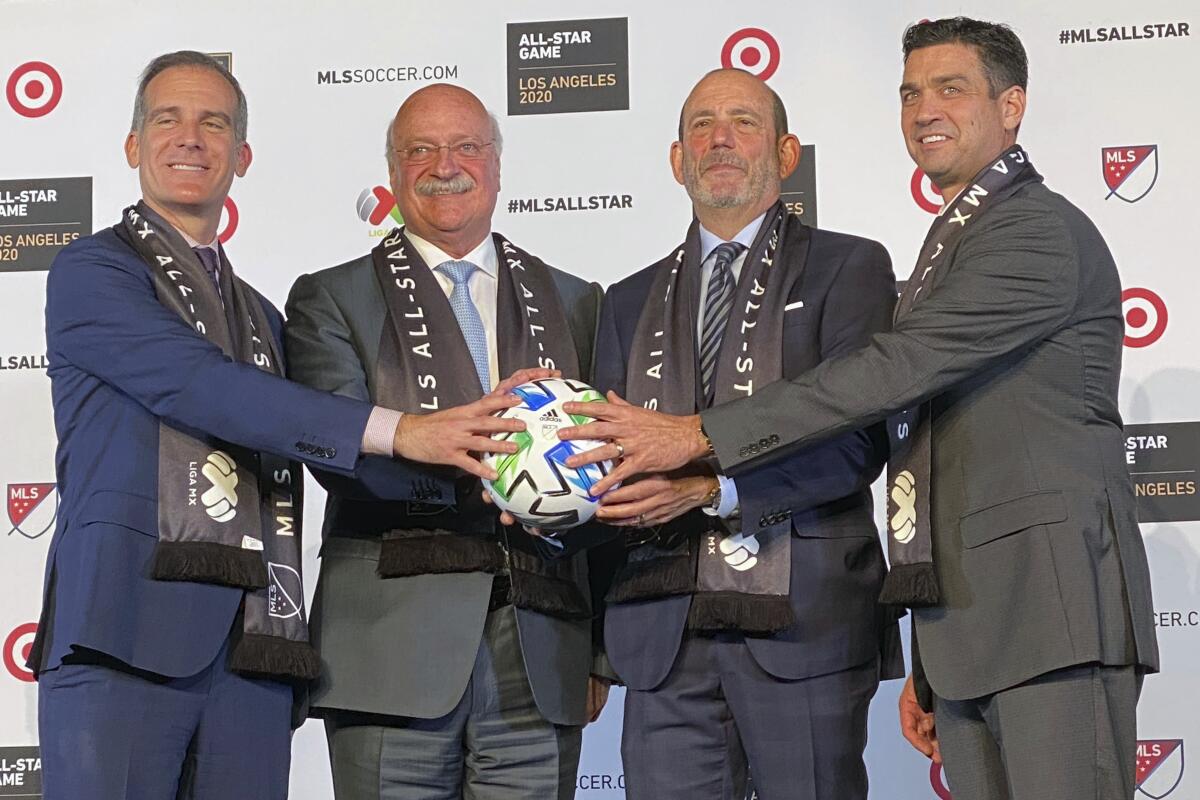It’s official: MLS All-Stars will face off with Liga MX stars in L.A.

- Share via
Landon Donovan has played soccer on both sides of the U.S.-Mexico border, starring for 15 years in MLS then coming out of retirement to spend part of one season with Leon in Liga MX. And, he said, that taught him there are more similarities than differences in the leagues.
So Wednesday’s announcement of a midsummer all-star game between players from both sides was an obvious step for Donovan, one that should lead to even closer ties between the two leagues.
“It’s just the tip of the iceberg,” he said. “And why wouldn’t it be? There’s too much value on both sides for the players, for the fans, for the leagues.
“It’s valuable for everybody.”
MLS commissioner Don Garber and Liga MX executive president Enrique Bonilla confirmed Wednesday that the format for the American league’s annual exhibition will change next season, with the MLS facing a team of Mexican all-stars on July 29 at Banc of California Stadium.
Major League Soccer is bringing its annual mid-summer all-star game to Los Angeles next season, when the league’s top players will be matched against a team of all-stars from Mexico’s Liga MX.
The leagues have competed for nearly a quarter-century in the annual CONCACAF Champions League. But in the last two years they have added the Campeones Cup, matching the respective league champions, and the Leagues Cup, a multiteam tournament that will double to 16 clubs next season, with games in both countries.
Now comes the all-star game.
For MLS the competitions raise the league’s profile among Latino viewers, who are far more likely to watch Liga MX than they are to follow MLS. It also figures to improve the level of play, where MLS teams have already begun closing the gap with their Mexican rivals.
For Liga MX, meanwhile, the partnership brings several marketing and financial benefits to its teams who, seeking bigger gates and better engagement with their fans, already play dozens of games in the U.S. each year.
“There’s nothing negative here. Nobody has anything to lose,” Garber said. “We all win here.”
Closer ties and new competitions with Liga MX was something the Boston Consulting Group recommended to MLS in a detailed study the league commissioned in 2016. The Athletic obtained a copy of the report earlier this month and released many of the findings, including suggestions that MLS consider a long-term partnership or merger with Liga MX. More competitions between the leagues, the study added, would help “engage viewers of LigaMX and other (Latin American) consumers.”
They either 1) pulled out of its tailspin with last week’s win over Canada or 2) accomplished nothing since the Americans were outplayed for long stretches by a team they have typically dominated.
That’s an audience MLS is chasing with fervor — and it’s one the Mexican league has already captured.
The Spanish-language Univision network says it aired 103 Liga MX matches from last fall’s Apertura and this year’s Clausura and averaged 860,000 viewers. That’s more than three times what ESPN and ESPN2 drew for the 31 MLS games it carried in 2019, when its average audience of 246,000 marked a 2% increase of the previous season. (The comparison is slightly skewed, however, since the Univision audience includes broadcast TV viewers while both ESPN networks are available only on cable.)
“There is no doubt that our leagues have been forging closer relationships in a wide variety of areas … that are about bringing our leagues together so that we can be more competitive against the rest of the world,“ Garber said.
Those ties are likely to grow in importance as the 2026 World Cup — which will be hosted jointly by the U.S., Mexico and Canada — draws closer








